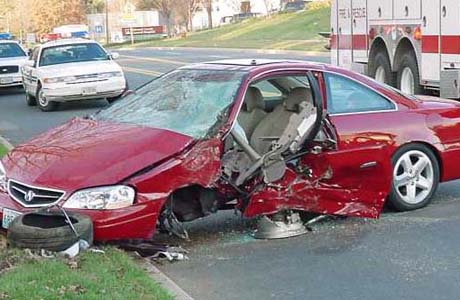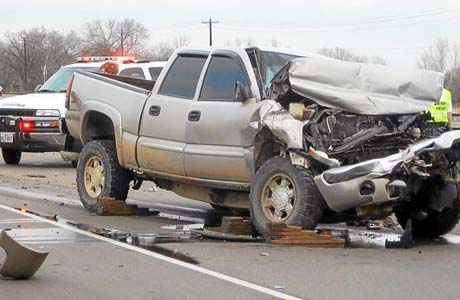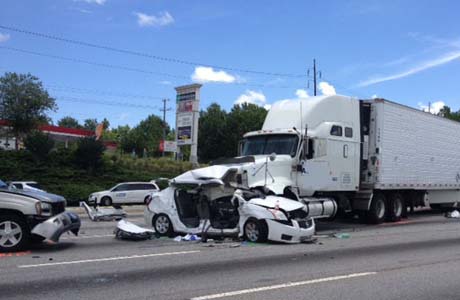What is my automobile accident case worth?
After you or a loved one is involved in a life-changing accident, you will want to know, “How much is my case worth?” In other words, you will be interested in evaluating the value of your legal claim, whether it is a car accident or any other type of personal injury case.
Whether you are seeking compensation directly from an insurance company or hiring an attorney to file a lawsuit, many factors can affect this value. No one-size-fits-all formula can be used to make this determination. Rather, there are several factors that you or your attorney must consider in arriving at a fair value.
Components that Establish a Case’s Value
In order to have a valid, compensable claim, it is imperative that the individual who caused your harm be legally at fault and his or her actions be the cause of your damages. Breaking this down, the three critical legal components in establishing the value of your case will be:
- Liability
- Causation
- Damages
When you assess damages, you should consider:
- Property losses (particularly vehicle repair or replacement)
- Medical expenses
- Lost wages
- Pain and suffering and emotional distress
- Loss of consortium
- Punitive damages
Insurance policy limits also will be a critical factor in determining the value of your claim. The amount you can recover may be limited by the defendant’s available insurance coverage. (However, in an auto accident, you can protect yourself from underinsured or uninsured drivers by purchasing UM/UIM coverage.)
Talk to Your Lawyer about the Value of Your Claim
The Self Law Firm can help you get every penny you deserve.
Call 205-647-1000
Your lawyer should give you a range of values for your case or claim. All of the factors discussed above as well as your lawyer’s experience with juries in the case’s jurisdiction can be factors in the evaluation of your lawsuit. Your lawyer should closely examine all of these factors.
Although some lawyers may advocate the use of ratios, personal injury calculators, claim calculators, auto claim calculators, wrongful death claim calculators, damages ratios or other types of formulas found on the Internet, these programs are merely tools. They are not conclusive in determining the value of your case.
When trying to determine the value of your legal claim or lawsuit, your attorney should base his numbers on a combination of all of the factors above. Your lawyer should also be able to explain to you how these factors increase or decrease the value of your claim and discuss why your claim has the value that he or she recommends.
Keep in mind: In some instances, especially early in your case, the question, “How much is my claim or case worth?” cannot be easily answered. To obtain a meaningful answer requires analyzing many facts and much information. Most importantly, it involves using the experience of a lawyer who has handled numerous personal injury cases.
Top 7 Things Car Insurance Company Won’t Tell You
Even though you pay insurance premiums and expect your insurer to live up to its end of the bargain when you file a claim, insurance companies generally are more concerned about protecting their bottom line than they are in paying you. For this reason, insurance companies often keep the claims process shrouded in mystery. The Alabama car accident lawyers are quite familiar with how insurers prefer to settle claims.
Here are seven things car insurance company won’t tell you:
1. Insurers can save money by having your car declared a total loss
After a car accident that causes serious damage to your vehicle, you may believe you are better off having your car declared a total loss, or totaled, so you can get a new one. However, this could actually be bad for you. If your vehicle is totaled, you may recover less than your vehicle is worth and less than what it would cost to buy a new one.On the other hand, totaling your vehicle could be good for the insurance company. It may cost less for the company to total your car than to do all of the required repairs.Because it is better for insurance companies to declare your car a total loss, they are increasingly taking this route. Collision Repair Industry Insight reported that between 20 and 22 percent of cars were totaled after accidents in 2009. This marked an increase from the 16 percent totaled in 2003 and 7 percent totaled in 1995.
2. The method used to value your car may not be what you’d expect
When a car is totaled, it has to be valued for the insurance company to pay out your claim. Edmunds and Kelly Blue Book are the two most commonly used sources for a car valuation. However, your insurer won’t rely on these sources alone. Instead, your insurer typically will use a complex formula to value your vehicle. For instance, the company may consider a market search for similar vehicles in the local area or compile a handful of computerized vendor quotes. Using a combination of formulas gives your insurer more room to manipulate their value estimate. For example, when using a market search or looking for similar vehicles, they may target a lower-cost nearby geographic area (like a nearby suburb if you live in the city) in order to show that the vehicle could be replaced for less. You have the option to contest the valuation that the insurer comes up with. However, to mount an effective challenge, you should get comparables and value the vehicle yourself.
3. Your car may be worth a lot less after it has been repaired
Unfortunately, even when a vehicle is fully repaired, it loses a significant amount of its value as a result of involvement in an accident (especially a serious one). When your insurer pays for your car repairs, you may still lose out because your car is worth less. In some cases, insurance policies will allow you to make a diminished value claim for the loss in value caused by the accident. However, you cannot claim diminished value. Be sure to check your policy to find out if this is an option for you. It is also important to pay attention to the parts put into your vehicle. Your insurer may wish to use generic parts or salvage parts rather than new parts from the dealer. Unfortunately, using these old parts can further reduce the value of your vehicle.
The Self Law Firm can help you get every penny you deserve.
Call 205-647-1000
4.Your insurance claim could bump your rates up a lot
There is a lot of mystery surrounding the way insurance companies set premium rates. The mystery gets even worse when it comes to how the insurer determines the increase in your premiums after an accident. In fact, many insurers won’t tell you what is going to happen to your rates after an accident.This can deter some people from reporting an accident to an insurance company, but it really shouldn’t. You take a big risk when you choose not to report a crash because your injuries and damage could later turn out to be worse than you originally thought. If you waited and didn’t get checked out by a doctor right away, then your injuries might not be covered.
5. Your friend’s bad driving can cost you
You may be worried about making an accident claim only if you were the one driving your vehicle at the time of the crash. However, if you lend a friend your vehicle, and the friend gets into a car crash while driving your car, you need to make an insurance claim.Your rates are likely to increase as a result of making the claim. You’ll also be out the costs of the deductible for damage and, if the claim(s) arising from the accident exceed your insurance policy limits, you could be personally sued. These are not chances you want to take. So, be sure to avoid lending your car to friends. At the very least, make sure your friends are insured.
6. Your coverage could be dropped or your claim denied
Insurance companies can drop clients under certain circumstances, such as when a client gets involved in a drunk driving accident. Usually, an insurer cannot drop you after a crash but before you make a claim. In other words, they can’t wait until you actually need insurance coverage and then deny your claim and drop your policy. However, if you lied on your insurance application, then your insurer can deny you coverage and deny your claim. For example, if someone was living in your home and regularly driving your car, but you told your insurer you were the only driver, this can be considered a material misrepresentation on your part. If the household member got into an accident and hurt someone, your insurance company very well could deny the claim.
7. Your coverage doesn’t extend to your personal property
Alabama requires that every driver buy liability insurance. However, this doesn’t protect your own cars or property. Liability insurance only pays out claims if you are involved in a car accident that causes damage to another car or injures another person. If you have only liability coverage and total your own car, then your car isn’t going to be covered, and neither are any items in your vehicle. If you do have insurance that covers your car in the event of a collision, it is important to note that this coverage provides you with financial compensation only if your car is damaged and you need to replace or repair it. If you had property or items of value in the car that got damaged as a result of the auto accident, your insurance company is not going to cover these losses.













 IQ Technologies
IQ Technologies